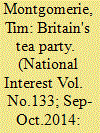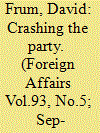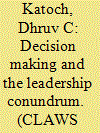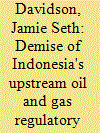| Srl | Item |
| 1 |
ID:
133633


|
|
|
|
|
| Publication |
2014.
|
| Summary/Abstract |
United Kingdom independence party and its leader, Nigel Farage, pose a dire threat to the British political establishment.
NIGEL PAUL FARAGE was a member of the Conservative Party when Margaret Thatcher was its leader. Today, he still looks and sounds a lot like an old-fashioned British Conservative. He wears pin-striped suits during the working week and bright red or yellow trousers on weekends-as many upper-class fashion criminals inexplicably do. He was educated at Dulwich College, a fee-paying private school where he enjoyed cricket and rugby and joined the army cadets.
|
|
|
|
|
|
|
|
|
|
|
|
|
|
|
|
| 2 |
ID:
115396


|
|
|
| 3 |
ID:
133660


|
|
|
|
|
| Publication |
2014.
|
| Summary/Abstract |
Three big trends -- a growing reliance on older voters, an extremist ideological turn, and an increasing internal rigidity -- have changed the Republican Party over the past decade, weakening its ability to win presidential elections and inhibiting its ability to govern.
|
|
|
|
|
|
|
|
|
|
|
|
|
|
|
|
| 4 |
ID:
121148


|
|
|
| 5 |
ID:
137627


|
|
|
|
|
| Summary/Abstract |
In late 2012, Indonesia’s Constitutional Court declared the law on oil and gas unconstitutional, ruling that the independent regulatory agency (IRA) interfered with the state’s direct control over the country’s resources as mandated in the Constitution. The controversial decision stunned the foreign investor community and Indonesia’s political establishment. To date, scholars have concentrated on the Court’s decision-making and have underscored the role that economic nationalism and political Islam played in opposing the Upstream Oil and Gas Regulatory Agency, which was viewed as a tool of foreign oil firms. This article presents an alternative perspective on the agency’s demise by deploying an institutional analysis of the IRA itself and its struggles to govern the country’s rich and hotly contested energy sector. It argues that while the vested interests that amassed against the agency were great, it was the country’s decline in oil production that sealed the IRA’s fate more than anything else.
|
|
|
|
|
|
|
|
|
|
|
|
|
|
|
|